LATEST NEWS
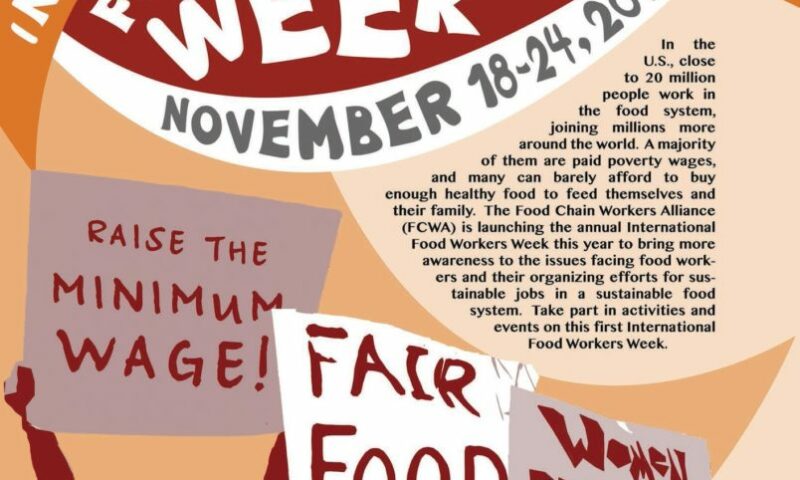
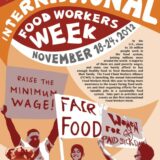
Thanksgiving is a time of year when most people give thanks for their family and their friends, for having a job (if they are lucky to have one) and for many other things in their lives. I am hoping that this year, you also give thanks to the hands that feed us.
The Food Chain Workers Alliance is launching the first annual International Food Workers Week during this Thanksgiving week (November 18-24) to bring more awareness to the hands that feed us – from the Native Americans and African slaves of not so long ago, to the Asian and Latino immigrant farm workers from the middle of the last century, and especially the nearly 20 million people in the U.S. from all races, ethnicities and genders who today ensure that food gets from the farm to our plates.
Yes, you are reading that right. About 20 million people work in America’s food system.
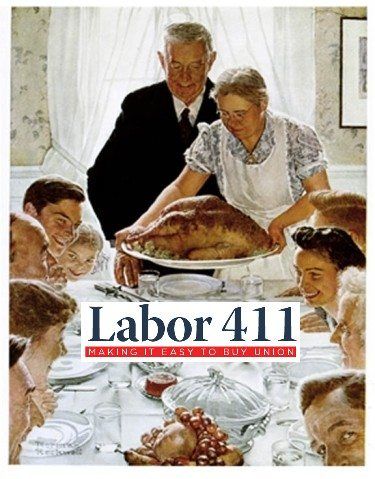
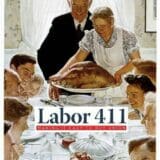
As you prepare to head to the grocery store to pick up your Thanksgiving dinner ingredients, double-check your shopping list to make sure your Turkey Day fixin’s are all union-made in America. Check out some highlights from the Los Angeles County Federation of Labor’s resource site, Labor 411. Here are some of the best union-made Thanksgiving eats and tools from the Bakery, Confectionery, Tobacco Workers and Grain Millers (BCTGM), Machinists (IAM), United Steelworkers (USW) and United Food and Commercial Workers (UFCW).
Appetizers
Turkey
Cookware/Cutlery
Side Dishes
Bread
» Read more about: Labor 411's Union-Made Thanksgiving Shopping List »

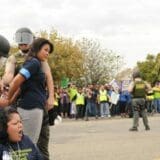
Six community members sat down Thursday in the middle of a major Riverside thoroughfare in front of the Walmart-contracted warehouse where workers are on strike.
The supporters were arrested by the Riverside County Sheriff’s Department while chanting “Si se puede!” (“Yes, we can!”)
“If you were all here in support of warehouse workers alone it would be a noble cause, but this isn’t just for warehouse workers. Your efforts benefit all working people,” the Reverend Eugene Boutilier told the crowd shortly before he was arrested.
Workers—who do not have a recognized union—went on strike Wednesday, Nov. 14, to call for an end to retaliation and unfair labor practices.
“We are standing up for ourselves to create a safe work environment, but we are continuously punished for it,” said Javier Rodriguez, a warehouse worker. “We decided to strike again because we are tired of being singled out and denied work,
» Read more about: Arrests Made in Walmart-Contracted Warehouse Strike »


After a presentation by Climate Resolve on the local impacts of climate change last month, our host, Jonathan Parfrey, jokingly told us that anti-depressants would be passed out at the door. Gallows humor is understandable and – for me – always necessary when faced with hard truths. But dare I say that I also felt slightly more hopeful armed with information that would help us plan for the future?
This briefing, held at the Municipal Water Department, presented the first in a series of studies, sponsored by the City of L.A. and the U.S. Department of Energy, that focused on how climate change will impact L.A. County by mid-century. A lot of complex modeling went into the study, and – in this era of climate science denial – our presenter, Dr. Alex Hall, the study’s lead author, was at pains to explain it to us.

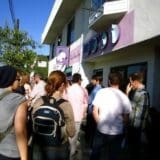
(On November 6, Long Beach became one of three cities in the country to pass minimum wage ballot measures, and the only one to guarantee paid sick leave to workers. This story is the second in a weeklong series of reflections on that important victory.)
Numbers never lie – that was our mantra at the Yes on Measure N headquarters. Canvassers for the hotel living wage law would come back talking about how a voter just wouldn’t give them the time of day, or how the 100-degree weather dragged on their hustle. And we would respond, “Well, numbers don’t lie.” This was just our way of saying, some days are good, some days are harder, but come the end of the campaign numbers will tell the true story of our hard work. And while I don’t want to oversimplify how we won,


As the 2012 elections approached I started to feel very guilty about the state of the country that my generation, which was born shortly after World War II, was about to leave to my grandchildren and their peers. The conservative agenda was promising to starve government services of all kinds – public schools, food stamps, even the post office – with the aim of privatizing institutions that have served our nation well for decades. More laws limiting women’s reproductive rights seemed on the horizon, global warming was being dismissed as a liberal hoax, and the rights of labor — well, don’t even go there. I was afraid to wake up to a Republican sweep and a future of desperation and dislocation for millions of Americans. It felt like a huge generational and personal failure.
Instead, the November 6 election was a salve to my baby boomer soul. Having cut my political teeth in the civil rights movement of the 1960s,
» Read more about: Election 2012: The Revenge of the Baby Boomers »


Former L.A. Mayor Richard Riordan has been in the news lately, arguing that city leaders need to take drastic steps to make Los Angeles more business friendly and get the city functioning again. He has blamed public sector unions for every woe facing the region, including the current financial crisis and potholes on his street in Brentwood.
Mayor Riordan is not just crying in the wilderness. His threat to put a draconian pension-cutting initiative on the ballot played a major part in prompting the City Council last month to hastily adopt its own pension-cutting plan – a plan that almost certainly will be thrown out by the courts as a violation of existing collective bargaining agreements.
Riordan’s resurrection as a major political force begs a fundamental question: How successful was he at bringing business and jobs to L.A. and overseeing scarce public resources when he was running the city?
» Read more about: Richard Riordan’s Wrong Ideas Don't Deserve a Second Chance »
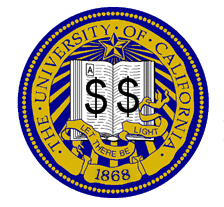

(The following post first appeared on Dog Park Media and is republished with permission. It describes events that occurred earlier today at a Regents meeting held at the University of California’s Mission Bay campus. A news update can be found here.)
About 500 students are currently blockading entrances to the University of California Board of Regents meeting at UC San Francisco this morning, where the Regents are scheduled to vote on a budget that presumes a 24 percent across-the-board increase on UC tuitions over four years. Picketing students have pledged to shut the meeting down.
According to Charlie Eaton, one of the organizers of the protest and co-author of a report released this week that charged the Regents with employing exotic financial instruments that doubled the UC system’s debt load over three and a half years, as of 8:45 a.m.
» Read more about: Students Protest UC Regents Meeting on Frisco Campus »
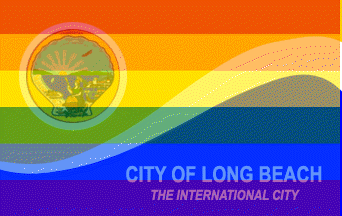

(On November 6, Long Beach became one of three cities in the country to pass minimum wage ballot measures, and the only one to guarantee paid sick leave to workers. This story is the first in a weeklong series of reflections on that important victory.)
Since the times of Supervisor Harvey Milk in San Francisco, lesbian, gay, bisexual, transgender and queer (LGBTQ) communities have worked with labor organizations to improve the lives of people simply trying to stay afloat in the world. Through the Coors beer boycott of the 1970s, Milk not only laid the foundation for a solid partnership between seemingly disparate communities, he created something much larger: a space for individuals, organizers and union representatives to grow, expand and converse. He created the opportunity for bonds to form and for hearts and minds to open and understand how difficult it was in the 1970s — both for working people and LGBTQ people to be afforded respect,
» Read more about: Why LGBTQs Backed Long Beach's Hotel Worker Living Wage »


The best measure of progress is often the desperation of its opponents. So if there were any doubt about the significance of Wednesday’s L.A. City Council vote to transform the city’s multi-family and commercial waste and recycling system, the shrillness of those in the minority offered final proof.
“This is the day justice and democracy died,” declared one detractor. He was outdone, however, by a fellow naysayer, who, invoking the ghosts of Stalinist Russia, bellowed, “Vote straight communist – the life you save will be your own. That’s what’s happening here today.”
Aside from the minions of big business interests following in lockstep with the Chamber of Commerce, there were few traces of authoritarian rule at City Hall yesterday when the Council made its decision to jettison a system that has failed almost everybody. Indeed, democracy seemed alive and well, with an overflow crowd both participating in and witnessing an epic exercise in self-government.
» Read more about: L.A.'s Failed Waste System Sent to the Trash Bin of History »
Millions of dollars in new tax revenue earmarked for the University of California system as part of the state’s recently passed Proposition 30 will instead be routed to major financial firms, because of bad bets made by a Wall Street-influenced UC Board of Regents.
Over the last decade, tuition and fees for undergraduates in the UC system have tripled, adding enormous debt burdens to UC graduates and pushing lower-income students into the already overburdened state college and community college systems, or out of higher education altogether. Members of the UC Board of Regents, which governs the system and which approved the tuition hikes, have blamed the increases on the bad economy and on politicians.
However, according to a new report written by five doctoral students at UC Berkeley, in the years preceding the 2008 financial collapse, members of the Board of Regents themselves had overseen “a qualitative shift in the financial practices of the University of California” by employing the same kinds of exotic financial instruments that precipitated the meltdown on Wall Street — primarily,
» Read more about: Proposition 30 Millions Already Headed to Wall Street »
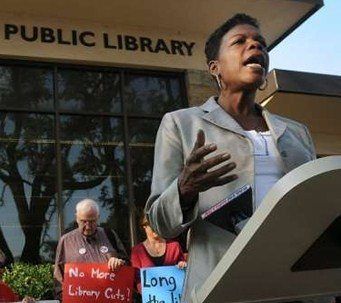
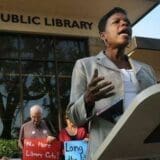
The would-be gravediggers of the New Deal and Obamacare have just begun their furious finger-pointing exercises as they try to figure out who to blame for the results of last week’s election. For progressive activists, however, November 6 was only a milestone, not the terminus, of a long journey to increase participatory democracy and build a more equitable America. Thursday, November 15, a number of them will gather at USC to lay out the nuts and bolts of their recently concluded campaigns, as well as to articulate their next moves.
Moderated by USC Political Science professor Ange-Marie Hancock, and sponsored by the university’s Program for Environmental and Regional Equity (PERE), “New Organizing for a New America” will explain what went right in 2012 and what strategies fell short, and how to make electoral organizing count for long-term base building. Among the topics to be discussed:
Participants include María Blanco,
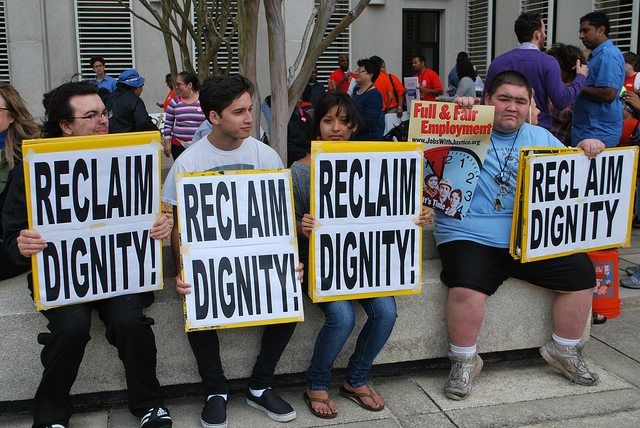
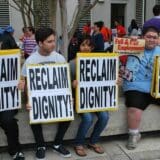
Analysis of swing-state voting in last week’s election demonstrates that the massive on-the-ground mobilization of union members and volunteers directly aided Obama and other pro-labor candidates in carrying Ohio, Nevada and Wisconsin. Unions prevailed in beating back anti-labor legislation in California and Wisconsin, and succeeded in three separate living wage campaigns.
On the national level, will labor remain vigilant and hold Obama and other newly elected Democrats accountable to workers? AFL-CIO President Richard Trumka vows that this will be the case.
In an interview with Salon, Trumka is quoted as saying:
“One thing that we’re doing different than we’ve ever done before … is we’re not dismantling our program today.” Instead, he promised, it will move “from electoral politics to advocacy, and from advocacy to accountability.”
As an example of the continuing momentum for labor advocates, Trumka points to Ohio, where “AFL-CIO members are 83 percent white.
» Read more about: Victorious Labor: Celebrations Before the Storm? »
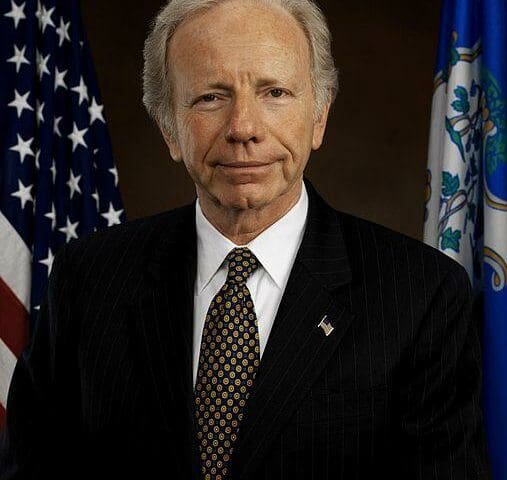
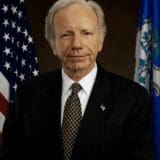
Other than voting for Obamacare, Joe Lieberman has done little good for the nation or the Senate since his petulant run as an Independent six years ago after Connecticut Democrats booted him out of the party.
Now that he is heading out the Senate door – finally – Lieberman is firing a parting “F— You!” shot at the country. It’s a little-noticed piece of legislation he is trying to move through his Committee on Homeland Security and Governmental Affairs — a bill that would effectively strip independent regulatory agencies of their power to effectively regulate just about anything.
Without holding a single hearing, Lieberman’s committee wants to pass the “Independent Agency Regulatory Analysis Act of 2012,” which strips the independence from a raft of federal agencies: Everything from the Securities and Exchange Commission to the Nuclear Regulatory Agency and National Labor Relations Board.
Among its many provisions, the law would require each of the agencies that Congress quite deliberately established as independent to submit all proposed rules to the White House for “vetting” before they could be published.
» Read more about: Joe Lieberman Bill Would Hobble Regulatory Agencies »


Over the last couple of years, I’ve blogged about waste reform in the City of Los Angeles. Following is a summary of where we are with the proposed waste reform so folks just tuning in, and those who have followed the twists and turns, have one central place for background as our the city council takes up this important issue in the coming weeks.
Disposal of waste is perhaps one of the most pressing environmental issues the City of Los Angeles faces. Los Angeles sends approximately three million tons of trash per year to landfills. This practice exacts a large environmental toll. The City has already promised to become a zero waste City by 2030. This entails interim goals of achieving 70 percent diversion from landfills by 2013 and 90 percent by 2025.
L.A.’s commercial and multi-family sectors are responsible for approximately 70 percent of the waste the City of Los Angeles send to landfills,
» Read more about: Transforming L.A.'s Trash Collection for the Next 50 Years »


Remember the spring and summer of 2011, when the Los Angeles Alliance for a New Economy (LAANE) was mysteriously tracked by MB Public Affairs? Beginning in May, 2011, this right-wing “political ops firm,” led by Karl Rove operative Mark Bogetich, launched a massive investigation into LAANE, requesting thousands of documents from virtually every elected or appointed official in L.A. County. With lots of public support, LAANE fought back and, after several months of press releases, petitions, blog posts and other “reveal thyself” exhortations to MB’s secret funder, the inquiry suddenly stopped. According to City Hall insiders at the time, MB’s requested documents were left uncollected and LAANE activists and supporters were left wondering who would possibly have wanted to spend an estimated $50,000 to find dirt on a nonprofit advocacy group that makes no secret about what it stands for.
Over the past year, the mystery of the secret investigation has continued to puzzle us.
» Read more about: Who Was Behind the Secret Investigation of LAANE? »
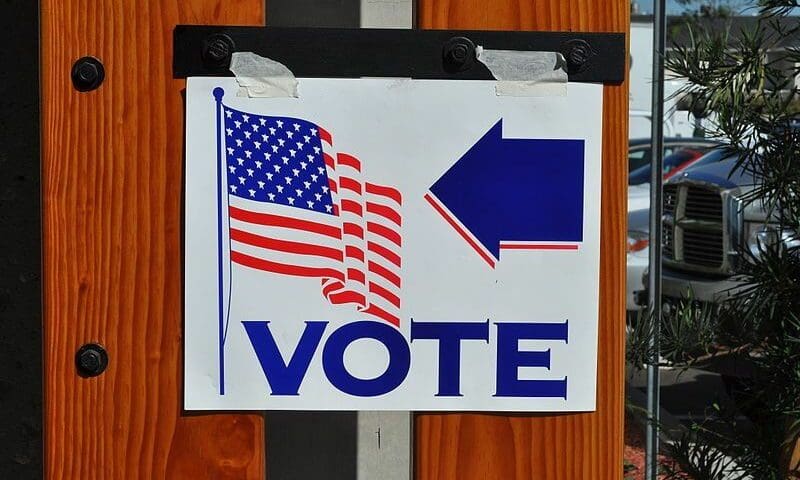
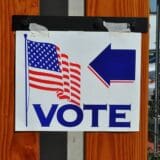
My mail delivery guy just got happier. He can finish his route while it is still light outside – this despite the change back from daylight savings time. Now he gets his work done in daylight: With the election over, he has less junk to deliver.
I don’t know how it was in your neighborhood, but in my apartment building the stuff filled the box every day for a month, and in the last week, so much mail rolled in that it couldn’t fit anymore. So my mail carrier patiently sorted it into clumps and placed it in the magazine space at the bottom of the mailbox area.
As far as I can tell, the vast majority of these ads went untouched, unless some conscientious soul threw them directly from the mail box into the recycling crate across the hallway. In any case, a couple of million dollars-worth of campaign mail wasn’t read,
» Read more about: Election Campaigning: Walking the Walk, Tossing the Ads »
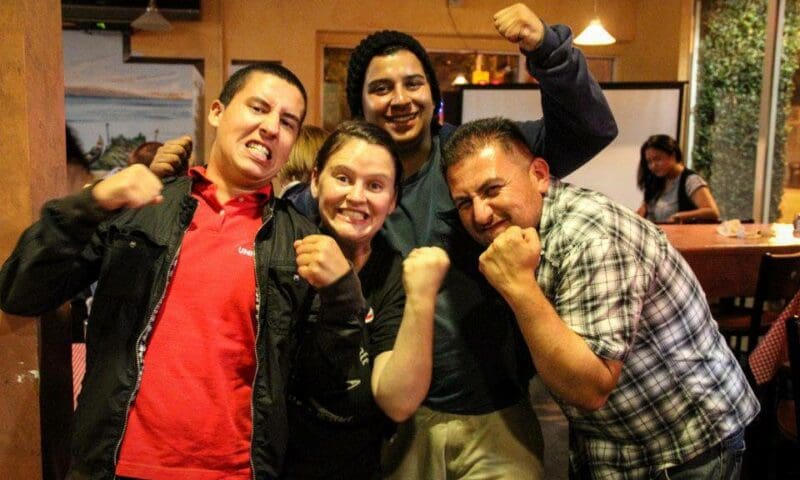

Two thousand workers who clean the rooms and serve the food at hotels in Long Beach, California had special cause for celebration election night. They will finally earn a living wage and be able take a sick day without risking a paycheck or a job.
“I have said all along that the second thing I would do when Measure N passes is take my family off of public assistance,” said Maria Patlan, a 10-year housekeeper in Long Beach’s hotel industry. “But the first thing I will do is a dance of joy.”
Maria and scores of workers like her helped lead the diverse Long Beach coalition that organized for months to pass the ballot initiative that became known as Measure N. It establishes a minimum wage of $13/hr (about $2,000 a month) in Long Beach’s hotels employing 100 or more, guarantees workers can earn five sick days a year and protects their tips.
» Read more about: Long Beach Hotel Workers Win Living Wages, Paid Sick Days »
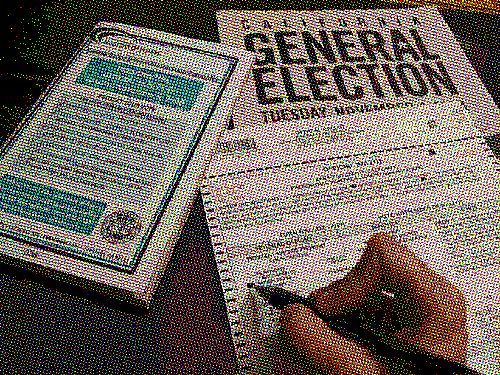
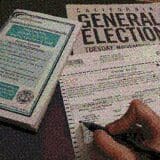
Frying Pan News spoke to five voters the morning after Election Day to hear their initial reactions to the outcome. Here’s what they told us:
Jonathan Parfrey wears several hats: executive director of Climate Resolve, president of the Los Angeles League of Conservation Voters and a commissioner at the L.A. Department of Water and Power. Election Day morning found him up early gathering climate-change documents in advance of a public DWP hearing. He remained unfazed by volatile election scenarios painted by pundits.
“I relied heavily on Nate Silver as my online therapist,” Parfrey said. “He kept fixing my head so I could function.” (Silver’s dry polling metrics, carried in his New York Times blog FiveThirtyEight, consistently predicted the presidential race to be a walk-off for Obama.)
Parfrey would vote that day at the L.A. Job Corps Center on Broadway.
“The volunteers were under 87 years old!” he marveled.
» Read more about: Election 2012: Five Personal Reflections »
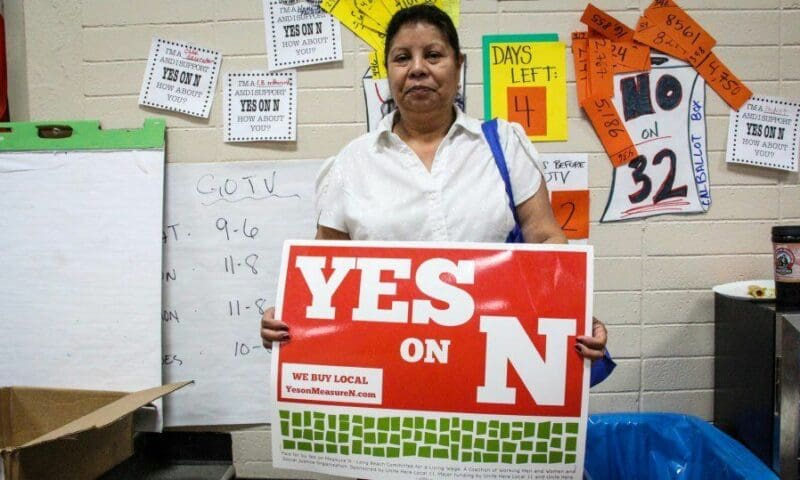
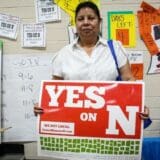
Something extraordinary happened Tuesday in Long Beach. A city long dominated by an ideologically driven business sector and marked by token community participation, embraced a living wage measure. With a resounding 63 percent of the voters in favor of Measure N, we can clearly state that the Long Beach community stood in favor of fairness and justice November 6. From a practical perspective it means lifting 2,000 Long Beach workers above the poverty line, perhaps a two-bedroom apartment for a family of four, or the “luxury” of taking a paid day off to attend to a sick child or relative. It also lays the foundation for renewed economic growth by providing additional income that will be recycled through the Long Beach economy.
How did this happen in a city controlled by business interests who said a living wage should not, could not and would not pass? By acknowledging four things:
» Read more about: Election 2012: The Battle for Living Wages in Long Beach »